 PROFESSIONAL GROWTH
PROFESSIONAL GROWTH
Click on the tabs below to advance your career by searching Contests & Awards, Schools, Festivals, Camps, Service Organizations, and our list of Services and Products, Scholarships and Grants and Events and Conferences.
And be sure to browse the excellent career advice offered by legendary Artist Manager Edna Landau in her Ask Edna blog and the entertainment law experts in their Law and Disorder blog.

US/Canada Arts Administration Degree Programs
Music Schools & Departments
Summer Music Camps & Special Programs
Services & Professional Music Orgs (non-profit)
Performing Arts Industry Events and Conferences
AskEdna: Career Advice blog
Scholarships and Grants
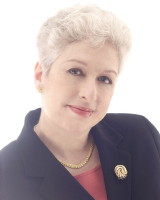 Edna Landau—doyenne of the music business, long-time managing director of IMG Artists and director of career development at the Colburn Conservatory of Music in Los Angeles—writes Ask Edna exclusively for MusicalAmerica.com to provide invaluable advice to music students and young professional artists. Read more about Edna’s impact on the performing arts.
Edna Landau—doyenne of the music business, long-time managing director of IMG Artists and director of career development at the Colburn Conservatory of Music in Los Angeles—writes Ask Edna exclusively for MusicalAmerica.com to provide invaluable advice to music students and young professional artists. Read more about Edna’s impact on the performing arts.Send your questions to Edna Landau at AskEdna@MusicalAmerica.com and she’ll answer through Ask Edna. Click the links below to read Edna’s recent columns on the critical aspects of launching and managing and professional music career.
Communicating with Your Audience
During Edna’s 23 years as managing director of IMG Artists, she personally looked after the career of violinist, Itzhak Perlman and launched the careers of musicians such as pianists Evgeny Kissin and Lang Lang, violinist Hilary Hahn, and conductors Franz Welser-Mõst and Alan Gilbert.
Edna believes young musicians can grow their own careers, with “hard work, blind faith, passion for the cause, incessant networking and a vision that refuse[s] to be tarnished by naysayers.”
Special Reports
Five Top Competitors: Lessons Learned from Winning and Losing
Winning a competition can be a quick launch pad to career success and fulfillment—but so can losing. Here are the stories of behind five competitors, each now at the top of his or her field. In our previous Competition Guide, we profiled singer and multiple-competition-winner Jamie Barton; this time, we turn to instrumentalists and a conductor.
The following article also appears in the Musical America 2017 Guide to Top Competitions.
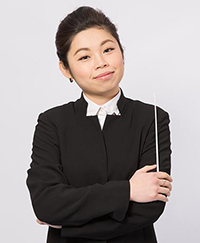 Elim Chan
Elim Chan
30, conductor
Winner, Donatella Flick Conducting Competition, 2014
Participant, Malko Competition, 2015
Chief Conductor, NorrlandsOperan, Sweden, 2017-18 season
“As a conductor, the moment you walk onstage, you’re being judged by all the orchestra musicians. You either get them or lose them in five minutes” (not to mention winning over the jury and the audience).
Such were Elim Chan’s challenges in 2014, enroute to becoming the first female winner of the Donatella Flick Conducting Competition, leading the London Symphony Orchestra in rehearsal and concert. Born in Hong Kong, Chan attended Smith College and the University of Michigan, where she was still in grad school when she entered the Flick. The biennial competition appealed to her because it seeks conductors with little professional experience; the prize is a chance to gain seasoning as assistant conductor with the LSO for one year. The players have a say in the result.
“It’s important to know what kind of conductor a competition is looking for,” she says. “I had no professional experience, and that is what the Flick seeks—someone with potential to grow.”
Conductors have an intrinsic problem preparing for a competition. “Violinists or pianists can practice their repertoire hundreds of times,” Chan says. “I couldn’t do that, because I needed an orchestra to work with.” She got together with musicians at school to perform works she’d be doing in the Flick, but still, when she made it to the finals, she was leading much of the repertoire for the first time with a real orchestra, including Rimsky-Korsakov’s Scheherazade and Stravinsky’s Symphony in Three Movements. Some jurors watched from seats in the orchestra as she led rehearsals. “I was scared, of course, before the first rehearsal. I remember thinking, what do I say to the LSO? Because they would be so good already, what do I do?”
The human touch
The turning point for Chan came in the break between rehearsals, when orchestra members came up to talk with her. She had felt uncomfortable in slow passages in Scheherazade, thrown by the orchestra playing behind the beat. But the musicians encouraged her. “They told me not to wait for them in slow music, just go ahead and do my thing, and they’d be there for me. A cellist said, ‘Don’t try to impress us. We’re the LSO. We play for (Valery) Gergiev, we play for (Bernard) Haitink. Just be yourself up there.’ That was the moment I started to feel more free.
Chan even took an interpretive risk in conducting Beethoven’s Egmont overture. “Usually when you hear Egmont, it’s very muscular, but I was looking for a lighter, more mellow sound,” she says. “At first, they weren’t really open to it, but I just insisted politely, and it worked. All three finalists conducted Egmont, and I think my performance stood out because I got a lot of my ideas in it.”
In 2015, Chan entered the Malko Competition with the Danish National Symphony Orchestra. “My experience there was quite mixed,” she says. “After you win a competition like the Flick, the pressure becomes double, and I felt I almost had to win the Malko. This weird expectation was messing with my mind.” She was eliminated after the second round, but it was a blip in her burgeoning career, which has included a fellowship with the Los Angeles Philharmonic and conducting the Mariinsky Orchestra in Russia and on tour in Mexico. Chan has been named chief conductor of Sweden’s NorrlandsOperan for a three-year term
beginning with the 2017-18 season.
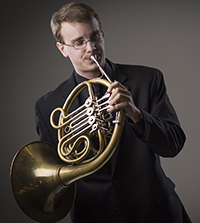 Austin Larson
Austin Larson
25, French horn
Winner, International Horn Competition of America
University Division, 2011
Professional Division, 2015
Assistant Principal Horn, Colorado Symphony
“A lot of horn players look upon playing solos with a certain sense of dread, but I’ve always enjoyed it,” says French horn player Austin Larson. “I’ve always felt more artistically free.” Certainly more so than when playing orchestral excerpts for an audition. “With solo repertoire it’s more about putting your personal stamp on it.”
Larson’s preference for solo performance has served him well in competitions. Most recently, he won the $2,500 first prize in the professional division of the International Horn Competition of America (IHCA), held at the University of Nebraska-Lincoln in 2015. A participant in IHCA since high school, he has long appreciated its educational focus. Candidates who don’t pass on to the next round are encouraged to meet with judges and discuss their playing, unlike some competitions that prohibit interaction with the judges.
“When you talk to them it’s like getting a lesson with 10 professionals for a fraction of the cost,” he says. “I’ve gotten useful hints on everything from stage presence to nitty-gritty details like intonation or sound production or ensemble with the piano.”
Lessons learned
Memorize. Larson plays everything in competition from memory, from standard repertoire such as Mozart horn concertos to Messiaen’s Interstellar Call, a difficult work that requires much extended technique. His advice to young players is, “memorize early and memorize often, because if you start early, it gets easier. If you start later, it’s a steep learning curve.”
Sing, then play. With degrees from the Cincinnati Conservatory of Music and Curtis Institute, Larson won the audition to be assistant principal horn with the Colorado Symphony in 2014. He finds “a decent amount of overlap” in how he prepares for competitions and auditions. “First, I make sure to sing everything through before I play a note on the horn, and I keep a preparation chart that allows me to maximize my practice time. For any given competition, I’m going to be preparing from 35 to 45 minutes of music, sometimes more, and that’s a lot to keep track of. It’s especially important to know where I’m at with technical passages that require woodshedding with a metronome to get them up to speed, or I can get really bogged down.”
Visualize. Larson is big on visualization. “That means not only picturing myself in the setting where I’ll be playing but also picturing myself emotionally, as in dealing with stage fright. Something that helps is looking at photos of the venue you’re going to be playing in. I find it helpful to set the photo of the stage on the background of my phone. Whenever I turn my phone on, I’m looking at that
picture and internalizing it. And I always imagine myself being as nervous as possible and still playing well.”
 Beatrice Rana
Beatrice Rana
24, piano
Winner, Montreal International Piano Competition, 2011
Silver Medalist, Van Cliburn International Piano Competition, 2013
Professional pianist
Thanks largely to her Cliburn win, Beatrice Rana is a busy international soloist, currently gracing major stages in London, Paris, Berlin, and her home base of Rome.
“Life changing” is how she describes the impact of winning the Silver Medal that came with a $20,000 award. “After the announcement of the prizes, the next day I got an email from the Cliburn with a list of the engagements I had for the following year. There were many recitals, and soon I was receiving invitations from great orchestras to play concertos. I felt that I had reached another dimension of my life.”
It was a dimension that was a long time coming. “My first competition was when I was five years old,” she recalls. “My parents are both pianists and they thought it was a nice opportunity to play for a couple of minutes in front of an audience.” She went on to enter and win competitions around the world, although competing was never the point.
“I don’t do competitions for the sake of it,” Rana says. “Competitions bring concerts. That’s what I want to do—be a concert pianist.”
Being a Cliburn medalist assured her of that: a three-year management contract was part of placing second in the prestigious quadrennial prize. “I remember when they announced the six finalists, they immediately asked for our passports because they were already going to apply for working visas in the U.S. That’s amazing, no? You really feel that they are working for you, not just for the competition.”
A close call
The Cliburn was not all smooth sailing, however: During her performance of Prokofiev’s Piano Concerto No. 2 in the finals, a piano string broke in the third movement. Potential disaster loomed. “What can you do?” she says, recalling a silent prayer that it wouldn’t impact her performance. “You just have to keep going and try to do your best. Life onstage is not relaxing. Somehow you have to deal with it.”
The Cliburn was Rana’s swan song to competitions, since she now has a career. This season she’s on an international recital tour with Bach’s Goldberg Variations, and her debut CD—Prokofiev’s Second Piano Concerto and Tchaikovsky’s First with Antonio Pappano and Orchestra dell’Accademia Nazionale di Santa Cecilia—was named recording of the month by BBC Magazine.
Rana doesn’t miss the pressure of competitions. “A couple of months ago I had a nightmare that I was playing the Cliburn again,” she says. “I woke up and thought, thank God it was a dream.”
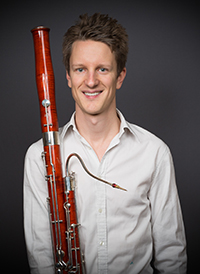 Sebastian Stevensson
Sebastian Stevensson
29, bassoon
Winner, Gillet-Hugo-Fox International Bassoon Competition, 2014
Winner, Swedish Soloist Prize 2016
Principal Bassoon, Danish National Symphony Orchestra
Sebastian Stevensson has an impressive record in international competitions, but when asked which of them was most helpful to his career, his response is surprising: “The one that went the very worst,” he says.
It was the 2013 Munich ARD International Music Competition, Germany’s largest competition, whose instrument categories vary from year to year. The ARD had been his very first competition, when he was 21, and that time he had been the youngest candidate to make it to the second round. By 2013, he not only had more competitions under his belt and had improved as a player, he was principal bassoon with the Danish National Symphony.
“I thought I had a great chance of winning, and then I went there and didn’t pass the first round,” he says. “It was hard—I probably spent 100 hours working on a demanding piece commissioned by the competition (Nyx by Evis Sammoutis) that I never performed—but the experience was also helpful for me. I had to reconsider so many things about my playing. It was a breaking point in my career.”
A lesson learned
Stevensson, from a prominent musical family in Sweden, had spent almost a year preparing for the 2013 ARD. “I practiced so much on the competition repertory and technical passages that I became a bit stiff. I was too focused on not making mistakes, which is dangerous…. [You should] focus instead on bringing a special atmosphere or special sound to a piece. That draws the listener in, so that, if you do make a mistake it’s not so disturbing.
“Also, you have to accept that you make mistakes. I learned that, if I put everything I have, all my beliefs, into a performance, then whether I win or not is out of my hands.”
Letting go enabled him to move on to greater success. He won the $10,000 first prize in the Gillet-Fox Bassoon Competition in 2014, the concluding event of the International Double Reed Society convention when it was held in New York City. Performing Hummel’s Bassoon Concerto with the Orchestra of St. Luke’s was among the prizes. Next came the 2016 Swedish Soloist Prize, winning against a pianist and a violinist in the finals, making him artist-in-residence with the Swedish Radio Broadcasting Union. He also won an audition for principal bassoon of the Munich Philharmonic, a position he held for a year before deciding he preferred living in Copenhagen.
“You have to learn to let go” he says of that competition loss. “That, of course, is applicable to a lot of things in life.”
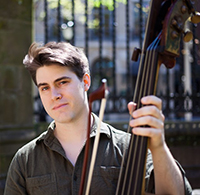 Sam Suggs
Sam Suggs
26, Double Bass
Winner, International Society of Bassists Solo Competition, 2015
New Music/New Places Fellow, Concert Artists Guild Competition, 2016
Assistant Professor of Bass, James Madison University
Sam Suggs’s bio describes him as an “omnivorous” musician. “I coined that term for myself to suggest an overarching philosophy that a musician should do a lot of different things and shouldn’t be overspecialized,” he says. “It is meant to describe the fact that I will eat anything that comes my way, musically.”
Suggs, who studied at Northwestern and Yale universities and now teaches at James Madison University, does indeed possess eclectic musical talents. They range from playing jazz piano and accordion to writing a scholarly paper on cadenzas in Mozart piano concertos, but it is as a double bassist/composer that he has made his mark in competitions. In 2015, he received the $2,500 Gary Karr Prize for placing first in the International Society of Bassists Solo Competition [and was subsequently chosen as New Artist of the Month by Musical America]. Then the next year he was named the Concert Artists Guild’s New Music/New Places Fellow at the CAG International Competition. At both events, he played some of his own compositions.
For the ISB competition, held at Colorado State University, Suggs researched who was on the jury. “I was going to be playing for an incredibly astute panel of bassists that I’ve watched perform over the years, and followed on YouTube,” he says. “Because there is a lack of repertoire that is idiomatic for the instrument, I decided I’d present some of my pieces in addition to the required program.”
He chose Daft Punk Chaconne, inspired by French electronic music duo Daft Punk’s dance hit Around the World; and Concerto After Haydn, his realization of a lost Haydn Concerto for violone, a forerunner of the double bass. “I think these entirely new pieces were really refreshing to the jury,” he says.
Upending the jury’s expectations
For standard repertoire, he looked for relatively unfamiliar works while keeping the bass’s physical demands in mind. “Every competitive bassist plays a piece by Giovanni Bottesini,” he says, “so I looked for one of his lesser-known works.” Otherwise, he says, “the judges might have preconceived notions or expectations of how the work should be performed. They might be thinking, ‘Well, you played it fine, but I’d have done it faster, or slower, or I would have started with the up bow instead of the down bow.’ You want them to be thinking of the music you’re making and not the decisions you’re making.
“That was key for me, to think of the jury not as a panel but as an audience I needed to engage with.” So he ended up with Bottesini’s Gavotte, instead of one of the concertos.
“I wanted something that the judges wouldn’t have strong opinions on, but that also wouldn’t burn my technique too much. Something charming and not too much of a strain.”
Clearly, it was the right move.







 FEATURED JOBS
FEATURED JOBS

 RENT A PHOTO
RENT A PHOTO






